- Home
- Chris Wraight
Vaults of Terra: The Carrion Throne Page 23
Vaults of Terra: The Carrion Throne Read online
Page 23
Spinoza gave up her testing of her bonds. They had bound her fast, the chair was solid, and in her weakened state there was no chance of breaking them.
‘To establish structures outside Adeptus Terra is forbidden,’ she said. ‘For that alone you would have earned death, but these other things – raids on the Emperor’s sanctioned agents, taking weapons–’
‘And how do you wish us to do this, if not with tools?’ Lermentov smiled again, but it was devoid of mirth. ‘Soon the Feast will reach its climax at the Gate and the priests will tell us to be thankful for everything we possess. Those with the power will smile, protected by the millions who keep them shielded from the worst, but what have these people got to be thankful for? They love the Emperor. Truly, they do. We ensure that there are no faithless among us, and they will die for Him just as you will. But they will not die for the High Lords. Not any longer. They will have enough to eat, enough to clothe themselves. Above all, they will be protected from the horror. That is why they come to me, and that is why we do what we do.’
Spinoza listened carefully, trying to establish what species of heresy this was. Perhaps Lermentov was merely a social revolutionary, foolish enough to believe that with a little compassion all the travails of his people could be somehow magicked away.
‘You have no idea of what you are protected from,’ she said.
‘Oh, really?’
‘You cannot.’
Lermentov shot her a contemptuous glance, and moved towards the wall to her left into which one of the iron doorways had been cut. He placed his hands, both of them, on a rusty lever sunk deep into the stone, and prepared to pull on it.
‘This is what we live with,’ he said. ‘See if you recognise it.’
He hauled down and the heavy door swung open with a squeal of metal on metal. A further chamber came into view, lit with strip-lumens that strobed painfully. Something crouched in there, something massive and coiled. As the door clanged back on its hinges, the thing unfurled, its limbs sliding and jerking over one another, its torso straightening. A domed metal head swung upwards, and pale grey flesh rippled under the harsh lights.
Spinoza’s eyes widened. The thing was horrific. Far taller and broader than a human, its ribs protruded starkly from a weeping mass of scar tissue. Its waist was wasp-thin, its chest and thighs engorged out of all proportion. Its hands were gone, replaced by claws fashioned from some glossy metal. Cylindrical vials protruded from the creature’s back and stomach, bubbling with liquid as they jostled amongst chitinous spines and vanes. Needles were half-buried under the skin, and wounds pulled apart by hooks. It hissed as it moved, swinging its head from side to side as if blind, then tried to leap at the open portal. Heavy chains yanked taut, pulling it back, and it thrashed wildly against its bonds. It stank of misery and confinement and… something else.
Spinoza recognised the stench from the Rhadamanthys. Perhaps not exactly the same, but with the same indefinable cloud of repugnance attached to it. She gagged, swallowing hard to dispel the nausea as the thing snaked and rattled against the chains.
‘Quite something, is it not?’ said Lermentov, unable to hide his own revulsion. ‘You know what these things are called? We had no true name for them, not until we took your assassin friend to see it, but she is of the Ordo Xenos and knew what it was straight away.’
Spinoza couldn’t take her eyes off it. Everything about it was a study in repulsion. It was clearly in terrible pain – every move was stilted and racked with trembling – but it was also driven by some malignant inner fury. Its limbs were distended horribly, as if the bones within had been broken and poorly set, and its muscles bunched in obscene clumps of bloodshot gristle, swollen into fists of churned flesh.
‘So now I can tell you, interrogator,’ said Lermentov grimly. ‘This thing was once a human – man or woman we can’t tell now. It has been turned into something your assassin called a xenotype eldar-beta, subtype grotesque. These things are hunting in the dark, all throughout the tunnels down here. The ‘blood rites’ you’re looking for? Look to these things. They are slaying freely. Nothing can touch them – they’re fast, they see perfectly in the night-dark, they’re stronger than our ogryns. They are terrible.’
She could believe it. The grotesque was trying to get at them again, lashing out against its bonds, pulling the chains tight and shaking them in their clamps. Drool hung in glittering loops from its hidden mouth, and its claws whickered in an insectoid clatter.
Lermentov hauled the lever back to its original position, and the thick doors slowly ground their way closed, sealing with a dull boom. Spinoza said nothing. Thoughts raced through her mind, one after the other, but few of them made any kind of sense.
‘That is what we fight,’ said Lermentov. ‘That is why the people come to our banner for salvation, because they know what these things will do to them if they are left alone. And there are even worse fears now, because we know what the origin of the monsters is. So when you discover these images of blood and horror, or find bodies pulled apart and corridors swimming in broken flesh, consider the cause, and think. We are not the authors, interrogator – we are the victims.’ He came closer to her again, and there was a savage pleasure of vindication in his eyes. ‘So we do hunt down weapons, and we do organise, and when we are taken by you we bluff and we hide as much as we can, even when the knives come out, because every one of us knows that unless we remain united there is no hope for those we leave behind.’
Spinoza thought back to what she already knew. According to Crowl, the Rhadamanthys had unloaded its cargo twenty days ago.
‘When did these… things emerge?’ she asked.
Lermentov shrugged. ‘I don’t know,’ he said. ‘We’ve been active for months, planning to seize our chance when all eyes were on the Gate, but this changed it all. Three weeks, perhaps, when we first noticed the killing? No more than that, but it’s getting worse, quickly. This one is the only one we’ve been able to capture, and it cost us dozens. They’re being bred fast, and soon there will be no eradicating them.’
‘You should have reported it.’
‘Ha!’ Lermentov clapped his hands together. ‘To the authorities, yes? The first one of us to do so would have been condemned as a fantasist, a xenos-lover, and his family would have been quietly disappeared. You do not understand this, do you? The people here have precisely three fears – the monsters, each other, and you.’
Spinoza remembered Crowl’s words then.
‘But I did not kill you,’ Lermentov went on. ‘See, even after all the pain you brought us, I took a final chance. We know where they are being made. Tonight is the night when we move on them, take our forces and burn them out. Many will die.’ He looked her directly in the eye. ‘It would be safer for me to kill you. Many of my followers urged me to do it quickly, lest more of you come. You have killed so many of us, Luce Spinoza, and it is hard for them not to hate. So why not do it?’ He shrugged. ‘Because I have no illusions about what we face. We will need every blade, and still the odds are it will not be enough. I cannot help but think He has a purpose in our meeting here. Now that you have seen these things, interrogator, you can guess the choice I will give you. You can die here, or you can do your duty and help us.’
Spinoza looked up at him sharply. He was entirely serious. Lermentov brought out a heavy key on a chain, and swung it idly, as if for temptation.
Every instinct railed against it. The man – the heretic – made her almost as sick as the creature in the cage. He was a fantasist and a rebel whose pride made him blind to the ruinous course he had taken, and deserved his place on the pyre just as truly as those who had listened to his poison.
But this was what Crowl had been hunting. It was here, buried under the mammoth spires, fomenting in the dark even as the hosts of blithe pilgrims coursed over the transitways towards the Palace precincts. This was what had come in on the Rhadamanthys,
and if the source could be found then that would give them the answers he had been seeking.
‘The others,’ she said. ‘Khazad, Hegain – you gave them this choice?’
‘You’re the commander. They’ll serve if you order them to.’
‘I condone nothing you have done.’
Lermentov smiled wearily. ‘Yes, that would be too much to hope for.’
She could barely bring herself to look at him. Her pride, her training, her judgement, all fought back hard, but there was a greater goal at stake now.
Gritting her teeth, she nodded. ‘I will aid you, for just as long as these things draw breath.’
‘You will swear that on the Holy Throne,’ Lermentov said, seriously. ‘I know what those oaths mean to you – you will say the words before the shackles come off.’
Now it was Spinoza’s turn to smile, albeit to herself. Words meant nothing – Tur had taught her that – but if it gave Lermentov some sense of security there was no harm in speaking them.
‘As you will it,’ she said, turning her wrists in their bonds to expose the locks. ‘Just tell me what to say.’
Chapter Twenty-One
Navradaran did not speak to Crowl on the way in. They took a flyer from the Outer Palace, passing through hemmed-in skies eerily free of atmospheric craft. The buildings were older here, edged with real stone quarried from the old earth – granite, marble, eroded limestone and wind-sheared sandstone, artfully arranged, placed with care and set in ranks of arches and tiered colonnades. The scale was still astounding, but artfulness was there alongside it – the first prototypes of building styles that would one day be raised on every world across the galaxy, the first gothic turrets, the first death’s head finials, the first dank images of cowled, sword-bearing angels standing silent sentinel. Some of these buildings had been old when the Emperor had given the first order to take to the stars. Now they were relics, fossils of a foreign age, empty veins threading back into a past of undiminished vigour.
If the Outer Palace was a riot of noise and heat, the Inner was marked with somnolence. The crowds were still intense, but the greater mass of them were high-ranking adepts rather than off-worlders, crushed by their duties into near-silence. Towers and belfries reared up on all sides, strung out with the connective matter of flyover spans and lofted transitways, casting everything below into a perennial gloom. The carved aquilae on every gable were sombre rather than proud, and the statues wept lines of old lichen from age-hollowed eyes.
Navradaran’s flyer carried them across the gently decaying worldscape. The sun rose a little higher, bleaching the spike-pinnacles and standard-poles with a mantle of drifting grey. The rippling forks of lightning came closer now, lancing in thin lines of ivory from the gyre of the heavy skies, gilding the eroding stone with flashes of short-lived silver.
The Sanctum Imperialis loomed ahead of them, dominating all else. Its outer profile was akin to the great ziggurats of Mars, though darker, huger, its edges marked with dagger-crowned campaniles of beaten ceramite. Tallest of them all was the immense turris virorum, the colossal tower of heroes, charred across its octagonal face with ancient fires and decorated with the emblems of a thousand Chapters of the Adeptus Astartes. It was said that the only path to its summit, lost high in the churning clouds, was via the Unbroken Stair, winding up through the centre of the hollow monolith, its flags worn smooth by the tread of uncounted priests, until one reached the great bell that tolled intermittently for the souls of the lost. When that bell pealed, the whole world heard its doleful boom.
Thicker storm clouds circled above them now. The epicentre of the vortex became visible to the naked eye, a slow spiral across the apex of the Sanctum, lit from within by snaking tendrils of lightning, underpinned by a steady roar of world-pain. The air itself felt heavier, tighter. When Crowl rested his hand on the arms of his chair, curls of static scampered across his gauntlet.
He could feel it. He could feel the residual actinic force, quickening in everything around him, driving the storm, making the immense constructions vibrate down to their lost roots. He could almost hear the whispers of the millions within that sprawling place – the aspirant astropaths led trembling to the amphitheatres of the Tower of Sight; the Imperial Courtiers gliding through velvet shadows of veined-marble halls; the cardinals overseeing prayers before the baroque altars – all of them ephemera around the one soul who truly mattered, who was locked deep under all the finery and the grandeur, who was there, and had been there at the start, and would be there at the end, and besides whose immortal actuality everything else was just a ghost of impermanence.
He found his heart beating faster. The more he looked at the Sanctum, the closer the colossal mausoleum drew, the thicker the air became, the greater the heat, the more his pulse picked up. He could have glanded something for that, but somehow he doubted the tranquilisers would work. What he was feeling had little to do with the physical, and everything to do with what fearful power lay encased within that cairn-temple, at once horrific and magnificent, dolorous and ecstatic.
The flyer set down before the first of the archways leading towards the Sanctum’s looming carcass, gracefully falling under a shadow of one of the nine Titanoliths – Vulkan the Gatekeeper, by his theological markings.
Only then did Navradaran speak. ‘The rest of the way, we walk. This is sacred ground.’
Crowl did not need to be told. He wondered what the purpose of this was – to awe him? To chastise him? He descended from the flyer’s golden cockpit and breathed in the static-laced air, pungent with incense and incalculable age, laced with the stench of mouldering stone.
White-robed, white-masked priests escorted them both from the platform, their chasubles embroidered with mystical visions of the Emperor-As-He-Walked-Among-Us. Mirror-faced guards in thick black plate armour stood sentinel on every exposed parapet holding force spears that glittered in the weak sunlight. In the far distance, high up on the terraces of the Sanctum itself, gold-armoured figures marched across age-charred battlements. From far below, Crowl could hear the rising drone of ritual benedictions, swelling up, endlessly, as if emerging from the earth itself.
They walked out onto a mighty path suspended high up in the air, stretching from the landing stages to the baroque flanks of the Sanctum itself. As they went, Crowl caught glimpses of the vast processional causeways, four hundred metres down, teeming with slowly moving crowds. Those were the most fortunate of all who had made the long journey, the chosen that had gained admittance through the Lion’s Gate and now trod the Blessed Path towards the holy of holies. A mere fraction of those present there would witness the great spectacle of the Feast itself, and yet for them it would be as if the world had ended and they had caught a fleeting sight of divinity itself, and if they survived it they would return to their home worlds as revered saints, pressed for every scrap of testimony by those who had not yet been born when the void-ships had first set out for the Throneworld.
But they were still far away from where they longed to be. None would be admitted within sight of the Gate until the final stroke of the Blood Chimes in two days’ time and the mania of Sanguinala reached its height. Through the subtle arts of the astropaths and the Ministorum calendar-scryers, lesser bells would be tolled at the exact same moment across the entire Imperium, and yet it would be here, at its very heart, on the soil where the Three Exalted Primarchs themselves had once contested for the survival of the human race, that the fervour would be greatest.
The Sanctum drew closer, filling the sky before them, ringed by the fire-braziers that boiled endlessly into the heat-scorched air. Heavy, massed drumbeats became audible – dhoom, dhoom, dhoom – a heart-rhythm that shimmered up through every lightless chasm and down into every buttress, on and on, eternal, untouchable.
Crowl began to feel fear. Real fear. Over his career he had witnessed so many depravities that the toll had shriven his body and withered hi
s soul, but never as an adult had he ever truly felt soul-deep fear, and yet here it was, creeping on him like a thief, sliding past all guards set against it and hastening his mortal weaknesses.
‘You are afraid,’ said Navradaran, right on cue.
‘There is nothing to fear,’ said Crowl, trying to shake the sensation off.
‘That is not true at all,’ said Navradaran. ‘Do not attempt to fight it.’
They reached the first of the portals. Custodians guarded it, each as gigantic and imposing as Navradaran himself. They did not so much as acknowledge Crowl, standing like soulless carvings on either side of the gilded aperture. Brazen doors over twenty metres high swung slowly open, and fusty air sighed out of from the pool of darkness within. Across the lintel were carved the words Eius sacrificio, nostram vitam in characters twice the height of a living man. Mute servo-skulls hovered around them, cataloguing, probing, before disappearing back into the gloom.
They passed within. The drumbeats became louder and more diffuse, resounding as if from vast wells below. Snatches of choir-dirge echoed and re-echoed from the vaults, drifting like spectres between vast, many-pillared columns. Arches swept above them into the murky heights, hung with weeping Ministorum pennants and age-pitted swords.
The ground trembled underfoot. It was almost unbearably hot. Once the doors had swung closed behind them with a soft echoing boom, the darkness became sweltering. Navradaran led the way, his armour a faint glimmer of gold amid the void-black shadow. Crowl caught only glimpses of what lay in those halls – shafts falling away towards the world’s heart, vertiginous naves marching into oblivion, immense orreries and planetariums tended by cowled adepts, masked priests prostrate before reliquaries of flame-stained gold containing old armour, old weapons, old bones, scraps of leathery flesh pinned within dark crystal lozenges…
He felt the cold swell of nascent panic rise in his gorge. His breathing became shallow and rapid. He could sense the immensity of it all pressing down, the age of it, the agony of it, crushing them both, toppling over them, entombing them here just as He was entombed here.

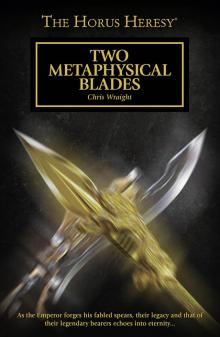 Two Metaphysical Blades
Two Metaphysical Blades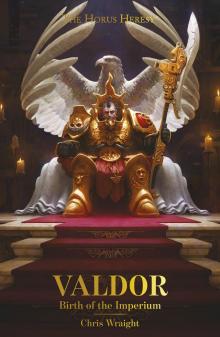 Valdor: Birth of the Imperium
Valdor: Birth of the Imperium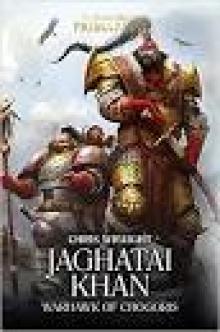 JAGHATAI KHAN WARHAWK OF CHOGORIS
JAGHATAI KHAN WARHAWK OF CHOGORIS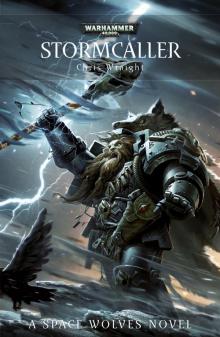 Stormcaller
Stormcaller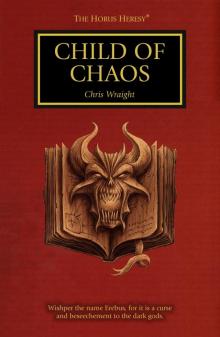 Child of Chaos
Child of Chaos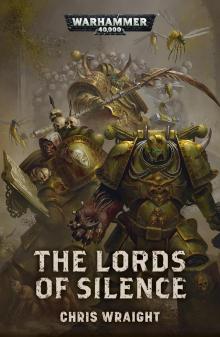 The Lords of Silence
The Lords of Silence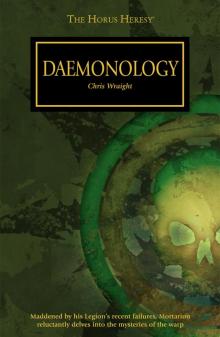 Daemonology
Daemonology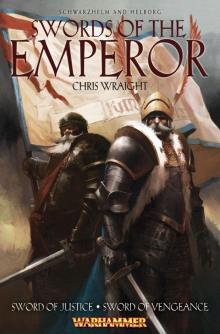 Swords of the Emperor
Swords of the Emperor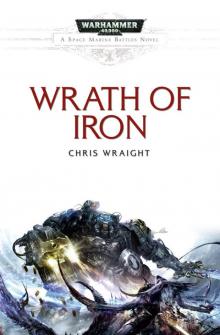 Wrath of Iron
Wrath of Iron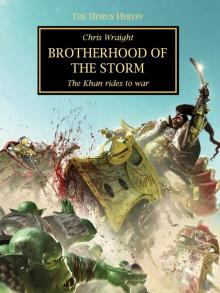 Brothers of the Storm
Brothers of the Storm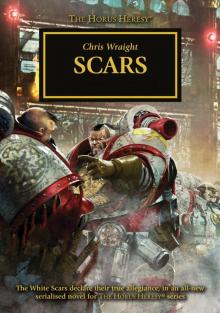 Horus Heresy: Scars
Horus Heresy: Scars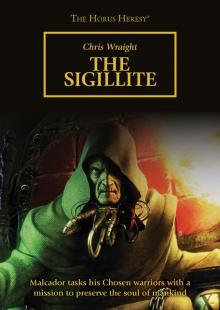 The Sigillite
The Sigillite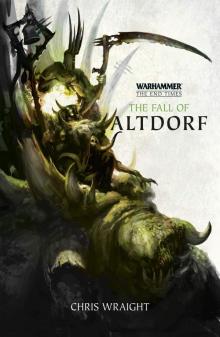 The End Times | The Fall of Altdorf
The End Times | The Fall of Altdorf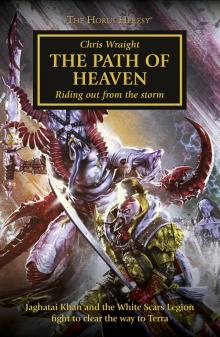 The Path of Heaven
The Path of Heaven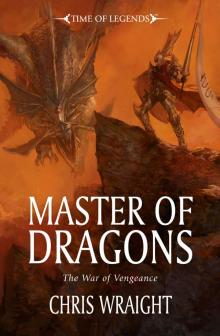 Master of Dragons
Master of Dragons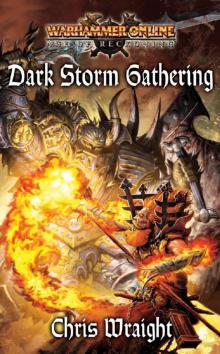 WH-Warhammer Online-Age of Reckoning 02(R)-Dark Storm Gathering
WH-Warhammer Online-Age of Reckoning 02(R)-Dark Storm Gathering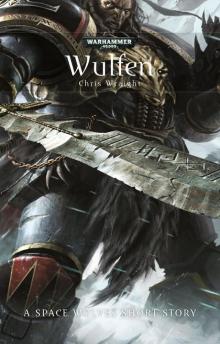 Wulfen
Wulfen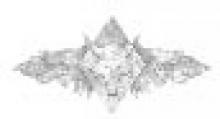 Battle Of The Fang
Battle Of The Fang Onyx
Onyx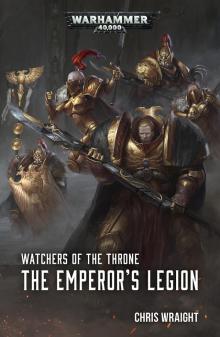 Watchers of the Throne: The Emperor’s Legion
Watchers of the Throne: The Emperor’s Legion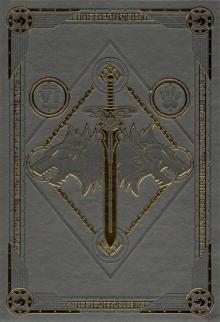 Leman Russ: The Great Wolf
Leman Russ: The Great Wolf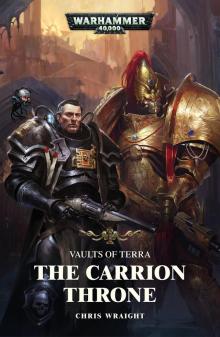 Vaults of Terra: The Carrion Throne
Vaults of Terra: The Carrion Throne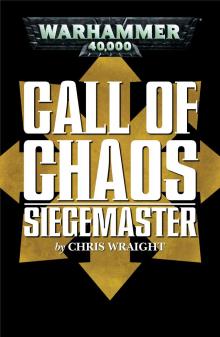 Siegemaster
Siegemaster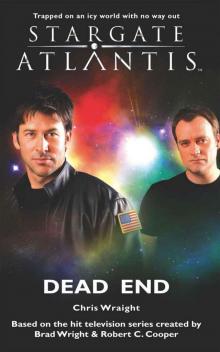 STARGATE ATLANTIS: Dead End
STARGATE ATLANTIS: Dead End Scars
Scars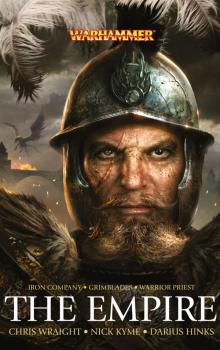 The Empire Omnibus
The Empire Omnibus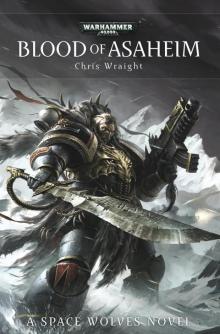 Blood of Asaheim
Blood of Asaheim